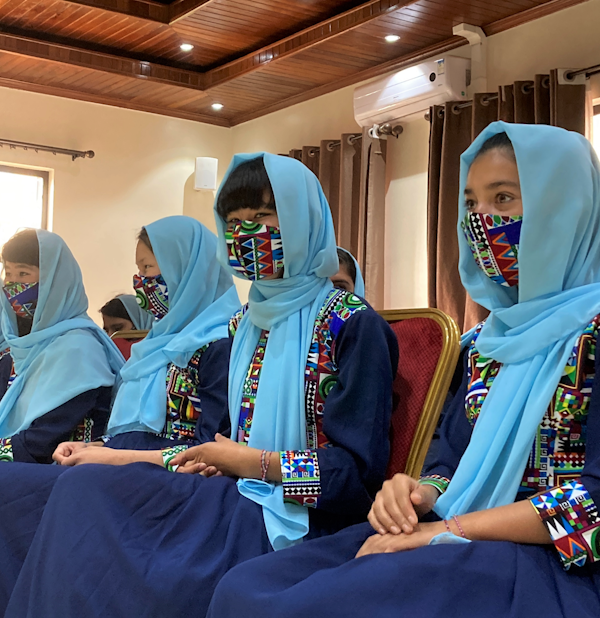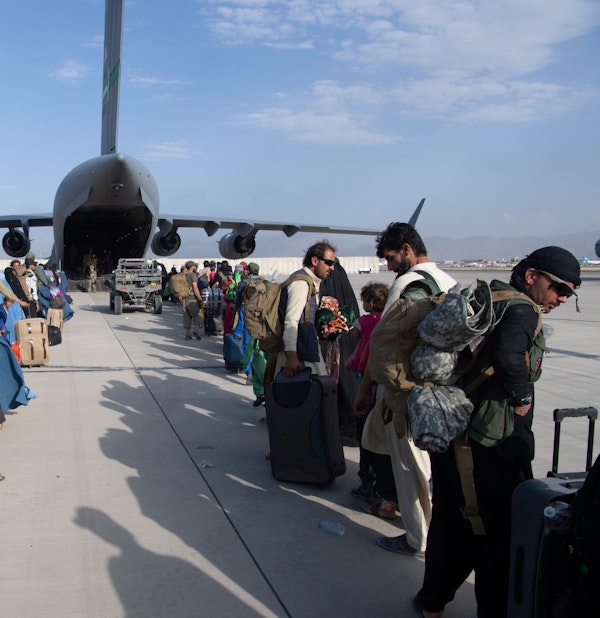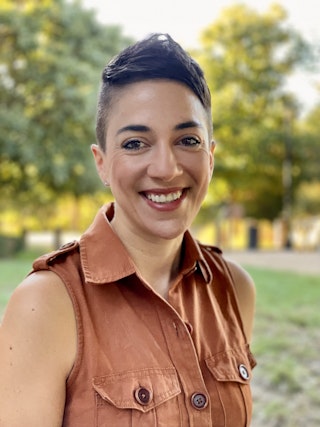The fight for the right to educate girls
Around the world, female students face extra obstacles. Nowhere are those worse than in Afghanistan. But one groundbreaking school has found a way.
 Students attending the School of Leadership, Afghanistan, an Afghan-led boarding school for Afghan girls. (Photo Courtesy of SOLA)
Students attending the School of Leadership, Afghanistan, an Afghan-led boarding school for Afghan girls. (Photo Courtesy of SOLA)
In communities around the world, equitable access to education remains a persistent problem. In most places, girls face extra obstacles due to deeply embedded gender bias and antiquated norms. Various barriers – things like transportation safety, household chores, early marriage, teen pregnancy, a lack of sanitation facilities and feminine hygiene products, and a scarcity of female educators – prevent many girls from accessing quality schooling. As of 2023, up to 129 million girls and young women – the vast majority of whom reside in countries affected by crisis – are unable to access formal education. Nowhere in the world is this challenge more severe than in Afghanistan, thanks to decades of instability and the Taliban’s unrelenting attempts to subject women and girls to institutionalized oppression.
Despite the fact that many experts have written off present-day Afghanistan as hopeless, innovators continue to push forward. Shabana Basij-Rasikh is one of them. The boarding school she co-founded – the School of Leadership, Afghanistan (SOLA) – continues to demonstrate that even amid darkness, with perseverance and ingenuity, light can prevail. SOLA’s creation was the culmination of a deeply personal journey for Basij-Rasikh. She was just 6 years old when the Taliban first took control of Kabul in 1996. Back then, Basij-Rasikh and many of her peers became unlikely symbols of resistance for simply daring to learn. Though the Taliban’s leaders quickly set out to erase the presence of female Afghans from everyday life, Basij-Rasikh’s parents were adamant that their children – both boys and girls – receive a comprehensive education.
Despite the fact that they risked severe punishment for defying the Taliban’s ban on girls’ education, Basij-Rasikh’s family encouraged their girls to attend underground schools. The allyship of her male family members – particularly her father – proved critical. This support was not only essential in facilitating a covert plan to access secret schools but it also challenged the Taliban’s patriarchal attempts at manipulating culture and faith for the purposes of gender-based oppression. Although the pursuit of education put the family in danger, Basij-Rasikh’s father believed that “the greater risks were what happens by not educating children.” To help protect their daughters, Basij-Rasikh’s parents cut her hair, dressed her in boys’ clothing, and carefully mapped different routes she and her sister could take to their secret schools each day to ensure they would not be noticed. Though the girls occasionally begged their parents to avoid danger by pulling them out of school, their parents would not relent. As Basij-Rasikh describes: “My father would say, ‘You can lose everything you own in your life. Your money can be stolen. But the one thing that will always remain with you is what is in here.’ And he would point to his head. ‘Your education is the biggest investment in your life,’ he would say. ‘Don’t ever regret it.’”
Every year of school completed by female students reduces infant mortality, maternal morbidity, and early or forced marriage.
Throughout the world, comprehensive education is one of the greatest drivers of peace and prosperity. When girls and boys have equitable access to learning, it seriously reduces their country’s vulnerability to problems such as destitution, disenfranchisement, extremism, and conflict. Children born to literate mothers are 50% more likely to survive beyond the age of 5 than those born to mothers who cannot read. Every year of school completed by female students – especially at secondary levels – reduces infant mortality, maternal morbidity, and early or forced marriage. From 2001 through August 2021 – when the Taliban was forced from power – child malnutrition, maternal mortality, and teenage pregnancy decreased significantly in much of Afghanistan. The mortality rate for children under 5 declined by half, marking the quickest decrease in child mortality rates across all low-income countries.
After the Taliban’s fall in 2001, Basij-Rasikh finally had the chance to attend an official school. To say she embraced the opportunity would be an understatement. Not only did she excel as a student in Afghanistan, but she would go on to study at Middlebury College in Vermont and then get a master’s degree from Oxford University. Basij-Rasikh’s story is a testament to the power of allyship and education. It’s one she hopes can become the norm for all girls.
With the development of SOLA, Basij-Rasikh has given the girls of Afghanistan new hope for safe education, even in the midst of chaos and terror. As the situation in Afghanistan worsened, SOLA took on a new responsibility – defending not just the right for girls to receive their education but also their right to be free of the violent and oppressive regime of the Taliban.
 Shabana Basij-Rasikh attends the "UNICEF España" Awards on September 2023 in Madrid, Spain. (Photo by Pablo Cuadra/Getty Images)
Shabana Basij-Rasikh attends the "UNICEF España" Awards on September 2023 in Madrid, Spain. (Photo by Pablo Cuadra/Getty Images)
A mission to lead a revolution
Basij-Rasikh co-founded SOLA in 2008 “with the mission of providing access to quality education … across her homeland.” In the 15 years since its founding, this mission has become Basij-Rasikh’s lifelong commitment. Boarding schools are by no means a new innovation. In a country such as Afghanistan, however, a boarding school designed exclusively for female students of all classes and regions was revolutionary. Between 2016, when it welcomed its inaugural class of 24 sixth grade students, and 2021, when the Taliban banned education for girls over the age of 12, SOLA worked relentlessly to provide access to rigorous learning, safety, and holistic support to a diverse student population. It tried to make its student body representative of nearly every province and ethnic background in Afghanistan. And it did all this in a way that showed respect for Afghan culture and faith – critical attributes in any traditional country. It created “an environment in which even the most conservative families in Afghanistan would feel comfortable sending their daughters,” Basij-Rasikh has noted.
SOLA also prioritized the importance of family and community engagement, particularly the vital role fathers and other male advocates can play in removing barriers to education. A daughter’s success is also her father’s success. By recognizing and honoring these relationships, SOLA catalyzed a growing network of allies that enhanced and expanded the school’s ability to deliver on key objectives. In its initial years, SOLA expanded at a rapid rate. Just five years after the school opened its doors to the first class of 24 sixth graders, four times as many students occupied SOLA’s campus.
After the Taliban took over, the only way to continue SOLA’s work was to relocate outside the country.
Things took a dramatic turn for the worse in April 2021, however, when the United States announced its official withdrawal from Afghanistan. The school’s leadership knew they needed to protect their staff, students, and facilities from the Taliban’s return to power. Contingency planning began almost immediately. SOLA’s team began monitoring rates of instability in students’ home provinces and meeting with contacts in the United States to form a better understanding the U.S. timeline.
By early June 2021, instability and anxiety was growing across Afghanistan, and Basij-Rasikh realized that the only way to continue SOLA’s work would be to relocate outside the country. It was a harrowing proposition – a risky move for anyone, let alone an entire school of children – but it was absolutely necessary for girls’ well-being.
On Aug. 5, 2021 – less than two weeks before the fall of Kabul – Basij-Rasikh flew to Kigali, Rwanda, to meet with government officials (including the Minister of Education) in hopes of gaining official approval to bring her students and staff to Rwanda. Five days later, she returned to Afghanistan, receiving official word on that very day that her school would be safe in Rwanda. But first, the SOLA team had to get themselves and their students out of Afghanistan.
In an attempt to safeguard SOLA pupils and family members who could not leave, Basij-Rasikh was forced to burn SOLA’s student records – “not to erase them,” she wrote, but “to protect them and their families” from Taliban retaliation. In an effort to evade increased suspicion and harassment at Taliban checkpoints along the journey to the airport in Kabul, school leaders organized their students into smaller groups and instructed many to pose as the children of staff. The girls donned long, traditional clothing and wore masks, making sure their hair was tightly covered. Like tens of thousands of other Afghans desperate to escape the brutality to come, SOLA’s students and staff made the dangerous trek into the sea of people outside the airport. The sights and sounds were haunting, but eventually more than 100 students and staff – Basij-Rasikh included – made it into the airport for processing.
With more than half of the SOLA group still stuck outside the perimeter, Basij-Rasikh refused to board her flight. Over the span of three days, she stayed at the airport, working to ensure that every staffer and student who intended to leave with them to Rwanda made it into the airport. When the last group of 52 was still unable to get through the labyrinth of checkpoints and crowds, Basij-Rasikh went out to find them. With the help of U.S. Marines, unrelenting tenacity and grit, and a bit of luck, Basij-Rasikh was able to get the remaining team members into the airport and onto flights out of the country. “This is what you do. You have 10-year-old girls, 11-year-old girls, 15-year-old girls stuck on the other side. You do anything you can to get them to safety,” she told 60 Minutes. In the end, SOLA accomplished the near impossible, evacuating nearly 250 students, staff, alumnae, and family members to Rwanda, where they would continue SOLA’s work. Less than two weeks after they escaped Kabul, classes resumed in Kigali.
 Afghans fleeing Kabul, Aug. 24, 2021. (Photo by Master Sgt. Donald R. Allen/U.S. Air Forces Europe-Africa via Getty Images)
Afghans fleeing Kabul, Aug. 24, 2021. (Photo by Master Sgt. Donald R. Allen/U.S. Air Forces Europe-Africa via Getty Images)
A new home
Rwanda may seem to be an odd landing point for SOLA, but it made sense given the needs of Basij-Rasikh’s school. Rwanda is still recovering from its own dark experience with civil war and genocide. The country also has an increasingly authoritarian government. But Rwanda’s bloody history meant both the hosts and SOLA could draw on analogous experiences of trauma to find new ways to support peace and healing among the students.
Upon arriving in Kigali, trauma counselors (rather than immigration officials) first received SOLA students, families, and staff – a stark contrast to the experiences of most refugees in other locations around the world. The Rwandan government also provided the school with a team of doctors and nurses in support of both physical and mental well-being. Immersive experiences like guest lessons at the Rwanda Institute for Conservation Agriculture and field trips to Nyungwe National Park have created uplifting opportunities for both learning and restoration. Even everyday moments are rooted in goodwill, empathy, and respect. For example, Rwandan neighbors have learned greetings in Afghanistan’s national languages and a landlord welcomed new Afghan tenants with a thoughtful gift of halal meat.
Since the evacuation, SOLA has continued to deliver on its long-standing promise of delivering quality education to Afghan students, albeit with some changes. Though SOLA remains fully committed to its original objectives, its current circumstances have required it to adapt. The Taliban’s restrictions on free movement for women and girls have made finding new students still trapped in Afghanistan incredibly difficult. So SOLA has focused its current recruitment efforts on Afghan refugees now living abroad. Because these refugees often also lack access to quality education in their new host countries, SOLA’s work remains as important as ever. This is especially true for Afghan girls who are stuck in limbo due to the immense roadblocks created by immigration bureaucracy, which prevents many families from reaching a permanent point of resettlement. For years now, millions of Afghans have been enduring temporary camps in places such as Albania, Pakistan, Iran, and elsewhere. Many of these Afghan families, especially in places like Pakistan, are unable to access quality schooling due to cost, lack of facilities, and bias against displaced populations. Many refugee parents are not permitted to work. And the status of many families could change at any point; some even risk deportation back to Afghanistan.
Because refugees often lack access to quality education in their host countries, SOLA’s work remains as important as ever.
Thanks to an innovative partnership with the International Organization for Migration, SOLA has been able to maneuver the arduous bureaucracy prohibiting movement for many displaced Afghans. As a result of this collaboration, in 2023, SOLA welcomed its first students to Kigali from the Afghan refugee population.
While the journey has been anything but easy, SOLA’s success has been transformative for students and their communities. In the face of the Taliban’s unrelenting oppression of women, the school’s commitment to a brighter future for Afghanistan endures. SOLA has continued to welcome a new class of sixth graders every year since its founding. In 2023 alone, the school received nearly 2,000 applications – its highest number ever.
While SOLA has had to adapt its model in response to the Taliban’s return to power, Basij-Rasikh and her team have not lost sight of their original objective of a permanent campus in the heart of Kabul. In the meantime, however, SOLA is focused on developing its current base in Rwanda. The school is also working on a complementary virtual platform to aid the millions of girls still in Afghanistan whom the Taliban refuses to educate. This platform also has the potential to support displaced students living as refugees around the world who are often excluded from accessing schooling due to financial hardship or xenophobia.
While SOLA’s model was developed in response to Afghanistan’s circumstances, it can and should be applied elsewhere. Though boarding schools are not new to low-income countries, SOLA’s approach is unique in that it prioritizes education alongside cultural sensitivities, inclusivity, resiliency, and well-being. It also challenges the prevailing perception that boarding schools are accessible only to the most elite, providing fully funded scholarships (which cover tuition, room and board, and other incidental costs) to every accepted student. SOLA is a U.S.-registered nonprofit, and the entirety of the organization’s efforts are funded by international grants, private foundations, and individual donors. SOLA also leverages the support of volunteers, inviting educators and others interested in aiding students to contribute their time and talent as virtual tutors. This is certainly a replicable model for organizations wishing to follow SOLA’s lead. They shouldn’t be discouraged due to lack of funding opportunities. The U.S. Agency for International Development and other similar entities give out billions of dollars every year to programs just like SOLA. As SOLA has proved, grant funding is a critical aspect of these programs’ successes, and it should be embraced by all programs working toward public well-being goals.
 SOLA students pose for a photo in their new home in Rwanda. (Photo Courtesy of SOLA)
SOLA students pose for a photo in their new home in Rwanda. (Photo Courtesy of SOLA)
For millions of girls around the world, access to quality education remains limited due to deeply rooted barriers such as gender bias, poverty, and violence. To confront these challenges, innovation remains vital. But as SOLA has proven, a fix doesn’t always require the creation of something new. A traditional boarding school model, adapted to meet the needs of female students in Afghanistan, allows girls who have been denied a quality education access to a comprehensive curriculum, holistic resources, and a supportive network invested in their success. Seeking shelter in an East African country recovering from its own history of violence and intolerance has allowed SOLA staff and students to find solidarity and learn from the trauma and healing of Rwandan communities. SOLA’s example demonstrates the importance of creative thinking when confronting complex challenges, and it also shows that lessons from the past often inspire hope and inspiration for the future.
In a world where the number of women and girls living in conflict-affected circumstances has grown by 50% since 2017, access to quality education and holistic support for female populations has become more urgent than ever. For others seeking to improve education outcomes for vulnerable women and girls in catastrophic contexts, SOLA’s model demonstrates that progress is possible with an unwavering foundation focused on safety, well-being, and quality curriculum for all.
For more on how you can support SOLA and other education initiatives focused on Afghan women and girls, visit https://www.bushcenter.org/publications/afghanistan-relief-and-resources.
Please note: This article was amended after publication to correctly reflect SOLA’s mission statement as well as length of time it took SOLA to start classes in Kigali after escaping Kabul.

